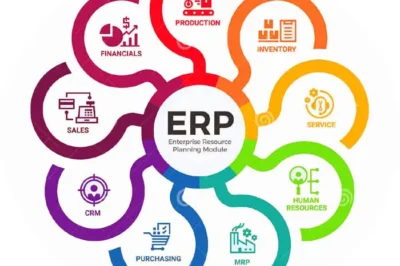
Cloud ERP (Enterprise Resource Planning) systems offer a range of core features that empower businesses to manage various aspects of their operations efficiently. Here are the core features typically found in cloud ERP solutions:
- Centralized Data: Cloud ERP systems provide a single source of truth for all business data, ensuring that information is consistent, accurate, and up-to-date across departments.
- Financial Management: Cloud ERP includes tools for managing financial processes such as accounting, general ledger, accounts payable, accounts receivable, budgeting, and financial reporting.
- Inventory Management: Cloud ERP helps businesses track inventory levels, manage stock across multiple locations, and optimize supply chain operations.
- Order Management: This feature allows businesses to manage the entire order lifecycle, from order creation to fulfillment and delivery.
- Supply Chain Management: Cloud ERP optimizes procurement, demand forecasting, supplier relationship management, and distribution processes.
- Customer Relationship Management (CRM): Cloud ERP systems often include CRM modules to manage customer interactions, sales leads, marketing campaigns, and customer support.
- Human Resources (HR): Cloud ERP offers HR capabilities for managing employee records, payroll, benefits, time and attendance, and performance management.
- Manufacturing Management: For manufacturing businesses, cloud ERP provides tools for production planning, scheduling, quality control, and product lifecycle management.
- Business Intelligence (BI) and Analytics: Cloud ERP systems offer reporting, dashboards, and analytics to provide insights into key performance metrics and facilitate data-driven decision-making.
- E-commerce Integration: Many cloud ERP systems offer e-commerce capabilities, allowing businesses to manage online sales, customer interactions, and order fulfillment.
- Mobile Access: Cloud ERP typically provides mobile apps that enable users to access and manage data from anywhere, enhancing flexibility and responsiveness.
- Document Management: Cloud ERP systems often include features for document storage, collaboration, and version control.
- Security and Compliance: Cloud ERP solutions implement robust security measures to protect sensitive data and ensure compliance with industry regulations.
- Customization and Integration: Cloud ERP platforms offer tools to customize workflows, create custom fields, and integrate with other systems and applications.
- Scalability: Cloud ERP systems can scale as the business grows, accommodating increased transactions, users, and data volumes.
- Cost Savings: Cloud ERP eliminates the need for on-premises hardware and reduces IT infrastructure costs while providing predictable subscription-based pricing.
- Updates and Maintenance: Cloud ERP providers regularly update the software with new features, security patches, and enhancements, ensuring that businesses stay up-to-date.
- Global Capabilities: Cloud ERP systems support multi-currency, multi-language, and multi-tax requirements, making them suitable for international operations.
- User Support and Training: Cloud ERP vendors often provide user support and training resources to help businesses effectively use the system.
These core features of cloud ERP systems contribute to increased efficiency, streamlined operations, better decision-making, and improved overall business performance.
Regards
Antony